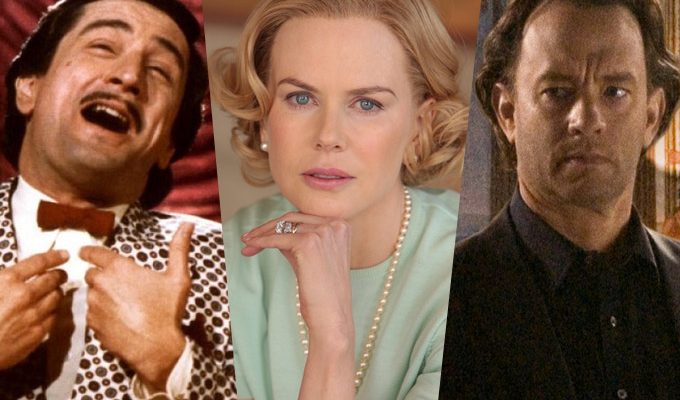
“The City Of Lost Children” (1995)
Having become sensations at home with their oddball, visually stunning apocalyptic film “Delicatessen,” Jean-Pierre Jeunet and Marc Caro were obvious picks to open the festival with their follow-up, steampunk fantasia “The City Of Lost Children.” But unlike when another local hero Luc Besson opened the festival a few years later with “The Fifth Element,” this was a film that satisfied most —it’s a stunning, Hollywood-level spectacle that won approval from many cinephiles as well. The film revolves around mad scientist Krank (Daniel Emilfork), who kidnaps children and takes them to an oil rig in order to steal their dreams and prevent himself from aging. When his adopted brother is taken, circus strongman One (Ron Perlman, in a French-speaking role despite not knowing the language) teams up with an orphan thief for a rescue mission. Undoubtedly indebted to Terry Gilliam, Jeunet and Caro’s vision isn’t totally original, but is so confidently and stylishly executed that you stop drawing comparisons and slowly become absorbed in as complete and compelling a world as had been seen on screen in some time. Some might dismiss the film as style over substance, and there’s undeniable plenty of style here, with Jeunet and Caro displaying bravura filmmaking that makes it a shame that this proved their last collaboration. But there’s also a soulful emotional core that makes it closer to, say, “The Wizard Of Oz” than some empty present-day blockbuster. A full-on stunner.
What they said at the time: Jonathan Rosenbaum at the Chicago Reader wasn’t convinced, saying that “the emotions seem almost as manufactured as the sets,” but Kim Newman was much more taken, calling it “as great a film as you thought ‘Chitty Chitty Bang Bang’ was when you were five years old.”

“Bad Education” (2004)
Recent years have seen Pedro Almodovar become a staple presence at Cannes, and it’s a mark of the esteem in which he’s held on the Croisette that his 2004 meta-fictional drama picture “Bad Education” was picked to become the first ever Spanish film to open the festival. It could be argued that the film doesn’t quite hit the heights of its predecessors “All About My Mother” and “Talk To Her,” but it’s not far off and certainly registers as one of the finest festivals openers of the 21st century. Drawing equally on noir, the movie business and the sex abuse scandals roiling the Catholic Church, the film sees director Enrique (Fele Martinez) approached by a man (Gael Garcia Bernal) claiming to be his old boarding school love Ignacio, who’s written a short story about their childhoods and molestation by an old priest (Lluis Homar) that he wants his old friend to turn into a film, but only if he can play the transsexual lead. As you might well imagine, all is not as it seems… This is arguably Almodovar’s most personal movie, but it’s neatly buried under a twisty blackmail story and layers of narrative trickery, amounting to a powerful attack on the abuses and corruption of the Church. Admittedly, some of the meta-playfulness means that the film’s at more of an emotional distance than the very best of the director’s work, but the staggering, mercurial turn from Gael Garcia Bernal more than makes up for it.
What they said at the time: Reviews were pretty stellar across the board: New York Magazine’s Logan Hill said that “like the best of Almodovar’s work, it throws you a first-love sucker punch that will stagger your heart, mind and soul.”

“Up” (2009)
In the middle of the best run of movies in its history (coming after “Ratatouille” and “Wall-E” and ahead of “Toy Story 3”), Pixar entered the record books as not just proffering the first animated movie to open Cannes, but also the first 3D film. Some might have decried the decision as the festival submitting to corporate interests, but that was likely before they saw the film (which we recently named as the third best animated film of the 21st century so far). The movie famously opens with a five-minute punch-to-the-gut as Carl and Ellie fall in love, get married, grow old together and are parted by her death, but that’s only the beginning, as the now-cantankerous Carl (Ed Asner) flies his house, complete with Boy Scout stowaway Russell, to South America in an attempt to fulfil a promise to his late wife, only to find an unlikely adventure full of talking dogs, giant birds and a maniacal explorer. Tinged with more of the spirit of Miyazaki than most of Pixar’s work, it’s also one of its most successful attempts to tinge kid-friendly humor (like the amazing dog Dug) with adult concerns, with the film proving a parable not just for grief but of making a new start. While it’s likely that nothing could have matched that initial montage, the remaining 90 minutes are still thrilling, hilarious and, when the payoff to the opening comes and Carl discovers the secret part of his adventurer’s book, just as emotional.
What they said at the time: People flipped for the movie, rightly so: The Hollywood Reporter called it “Winsome, touching and arguably the funniest Pixar effort ever” and “an idea choice to serve as the first animated feature ever to open the Festival de Cannes.”

